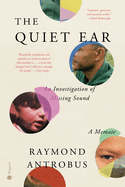
Raymond Antrobus's first nonfiction book, The Quiet Ear, takes up the themes of his poetry--being deaf and mixed-race, losing his father, becoming a parent--and threads them into an outstanding memoir that integrates his disability and celebrates his role models.
Even with hearing aids, Antrobus (All the Names Given; Signs, Music) explains, he catches just 60% of conversations; the rest he must fill in. He was diagnosed with high-frequency deafness at age seven. "My superpower has become lip-reading and perfecting my listening face." What has he been missing? What has he gained in return? These questions drive the touching exploration of his coming to terms with Deaf identity.
The several strands of inquiry include his family history (a Jamaican father experiencing alcoholism; a matrilineal lineage of English painters and ministers), the development of deaf education (Thomas Braidwood opened the U.K.'s first deaf school in Hackney, London--where Antrobus grew up--in 1783), and teachers and Deaf public figures who have inspired him, such as singer Johnnie Ray. He recounts his hobbies of competitive swimming and performance poetry, and early dead-end jobs. As a teenager and young adult, he felt so ashamed that he would leave his hearing aids out and eschew sign language. Now, he recognizes his good fortune to have "lived between the deaf and hearing worlds" and earned not just "an art, a history, a culture" but "much hard-won strength and insight."
This frank, fluid memoir of finding one's way as a poet illuminates the literal and metaphorical meanings of sound. --Rebecca Foster, freelance reviewer, proofreader and blogger at Bookish Beck

